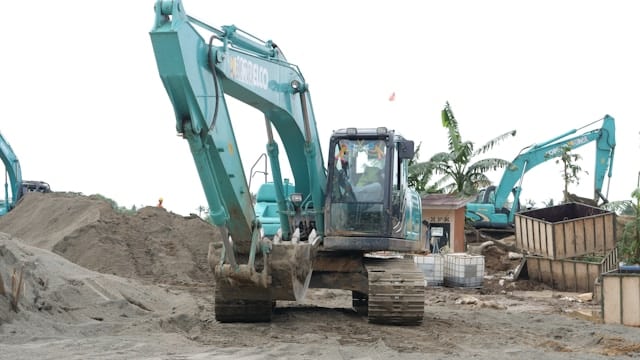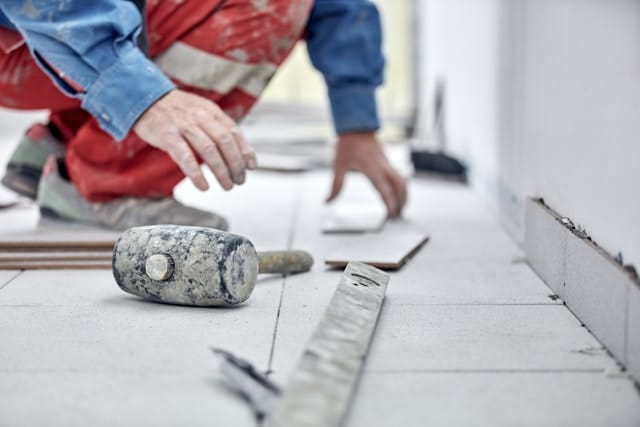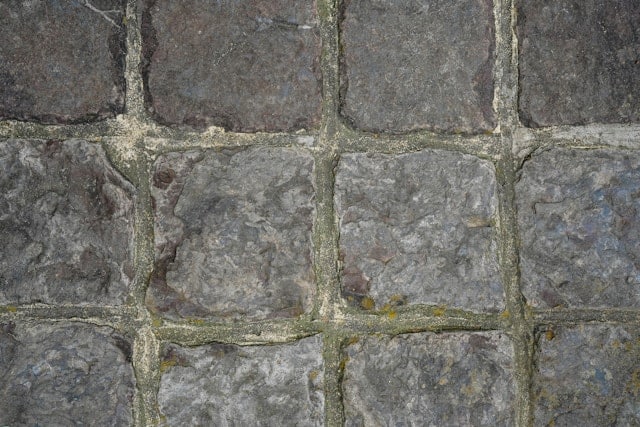Have you started noticing cracks in your walls or uneven flooring that seem to be getting worse over time?
These issues might seem small at first, but they can point to deeper problems—like shifting soil or water intrusion beneath your foundation. Left unaddressed, these conditions could lead to costly structural damage and ongoing stress.
That’s where a reliable solution like chemical grout repair comes in. It strengthens loose soil, fills hidden voids, and seals leaks without tearing up your property.
At Helicon, we use this proven method to restore stability from the ground up—especially in Florida’s moisture-sensitive environments where traditional repairs may fall short.
In this blog, we will talk about:
- How chemical grout works to seal leaks and stabilize soil
- Where this method performs best—and why it suits Florida foundations
- How Helicon delivers precise, long-term repairs using specialized grout solutions
Let’s break it down and explore how chemical grouting could be the answer to your foundation concerns.
Understanding the Chemical Grout Repair Method
Chemical grout repair is a precise process that involves injecting specialized liquids into the soil or voids beneath your foundation. These materials quickly react and expand to fill empty spaces, seal cracks, and strengthen weak soils.
The result?
A more stable, water-resistant base that helps prevent further movement or structural damage.
What Is Chemical Grouting?
Chemical grouting is a low-impact solution used to reinforce soil and control water flow around foundations.
It works by injecting liquid chemical compounds—such as polyurethane or acrylic—into targeted areas within the soil or concrete. Once in place, these compounds harden or expand, depending on the formulation, to fill cracks and voids.
The material is typically applied using low pressure, allowing it to spread gradually through gaps without disturbing the surrounding structure. This approach avoids the need for excavation or replacement, making it a highly efficient option for stabilizing foundations in Florida’s loose and moisture-prone soils.
Types of Chemical Grouts
The two most commonly used grout types are urethane and acrylic grouts, each selected based on the project’s specific needs:
- Urethane grout: Expands significantly upon contact with moisture, making it ideal for sealing larger cracks and stopping active water leaks. Once cured, it remains flexible and durable.
- Acrylic grout: Best suited for sealing very fine cracks or small voids. It forms a dense gel that resists shrinking and performs well in wet environments.
At Helicon, we primarily use polyurethane grouts for soil stabilization and foundation repairs. These grouts combine strength and flexibility, key factors for long-term performance in Florida’s unpredictable ground conditions.
Common Applications
Chemical grout injection is a versatile technique that our team uses to solve a range of structural and soil-related problems, including:
- Sealing cracks in concrete slabs or basement walls to prevent water intrusion
- Stabilizing loose or weak soil under foundations, slabs, or pool decks to minimize shifting and settling
- Sinkhole mitigation, where voids are safely filled to prevent further collapse
- Seawall reinforcement, sealing gaps, and reducing erosion near coastal structures
Thanks to its adaptability, this method works well in many environments. With over 20 years of experience in Florida, Helicon continues to deliver customized, site-specific solutions that restore confidence in your foundation.
Step-By-Step Chemical Grout Repair Process
Chemical grout injection isn’t just about filling cracks—it’s a carefully controlled process designed to restore structural stability from the ground up. It starts with a detailed assessment, followed by precise material placement and monitoring to ensure long-term success.
Here’s how the process works from start to finish.
Site Assessment and Preparation
First, inspect the affected area in detail.
Identify cracks, voids, or weak soil zones where you will inject the grout. This helps decide the best grout type and injection points.
Before injection, clean the site so the grout bonds well. Remove loose debris and dry the surface if needed. Sometimes, drill small holes in concrete or soil to let the grout reach deep cracks or underground spaces.
Safety is important. Prepare equipment and wear protective gear. The preparation stage controls where grout flows and prevents waste or damage.
Injection Techniques
Grout is injected using low-pressure equipment that gently pushes the material into targeted soil or structural gaps. This approach avoids adding stress to surrounding areas while allowing the grout to expand and lock into place.
- Pumps, hoses, and injection ports are positioned with precision near the affected zones.
- Grout is applied slowly and evenly, giving it time to expand and seal the voids.
- It reacts almost immediately with moisture in the ground, creating a solid, stable mass underground.
Selecting the right formulation matters. Some grouts cure faster, others offer more flexibility or strength. Our team customizes every mix based on site-specific conditions to ensure durable results.
Curing and Monitoring
Once the grout is injected, it needs time to cure, which typically takes a few hours to a full day. During this stage, the material hardens and integrates with the surrounding soil or structure to reinforce the area.
After curing begins, we monitor the site for signs of settlement, grout leakage, or incomplete coverage. This includes:
- Verifying that cracks are sealed properly
- Ensuring there’s no movement or instability at the surface
- Conducting follow-up injections, if necessary, to strengthen the treated zones
Ongoing observation helps confirm long-term success and allows adjustments where needed.
Advantages and Limitations
Chemical grout repair offers a highly effective way to address soil instability and water infiltration, but like any solution, it comes with important considerations.
Let’s look at what makes this method stand out and where it may have limitations.
Key Benefits
This method is known for its precision, speed, and adaptability. Here are some of the biggest advantages property owners in Florida can expect when using chemical grout repair:
- Creates a strong, waterproof seal that blocks water intrusion and reinforces weak soil zones
- Ideal for tight, hard-to-reach spaces where traditional repair methods can’t access
- Quick, minimally invasive process—you often see results fast without tearing up landscaping or concrete
- Adapts well to Florida’s challenging soil conditions, including sandy and moisture-sensitive areas
This technique is especially effective for stabilizing foundations and stopping leaks in situations where precision and minimal disruption are essential.
Potential Drawbacks
While chemical grouting is a powerful solution, there are a few things to keep in mind before choosing this method:
- Chemical grouting can cost more than older methods like compaction or cement grouting, due to the specialized materials and skilled application it requires
- Not always suitable for major structural damage or large cracks—in such cases, additional reinforcement (like push piers or slab piers) may be recommended
- Some grout types may degrade over time if exposed to extreme environmental conditions, but proper product selection and expert installation by Helicon significantly reduce that risk.
That’s why working with a qualified team is critical. Helicon evaluates every site carefully to determine whether chemical grout is the right solution or should be paired with other structural stabilization methods for the best long-term outcome.
Best Practices and Safety Considerations
Chemical grout repair is a powerful solution—but like any construction method, it must be handled with care. Following best practices around safety, environmental responsibility, and ongoing maintenance helps ensure your repair holds up over time.
Safety Protocols
Handling chemical grout requires attention to personal safety. The right preparation can prevent irritation or exposure while ensuring smooth execution on-site.
- Wear protective gear such as gloves, goggles, and masks when mixing or applying grout. These chemicals may irritate your skin, eyes, or respiratory system.
- Always work in well-ventilated areas. If the repair is indoors, ensure airflow with fans or open windows.
- Keep materials out of reach of children and pets, and store chemicals in locked, secure spaces.
- Leftover grout should be disposed of properly according to local hazardous waste guidelines—this prevents contamination and keeps your space safe.
- Before beginning any repair, read all product labels and safety data sheets.
Our technicians follow industry-standard procedures to reduce risk and protect your property.
Environmental Impact
Chemical grout can affect the environment if not handled properly.
Avoid spilling grout on soil or in water sources because it can harm plants and wildlife. Use only the required amount to prevent excess chemicals from seeping into the ground.
Plan your repair to minimize disturbance to the surrounding area. This helps preserve local ecosystems. Consider products with lower toxicity or formulations meant for sensitive environments. We prioritize solutions that reduce environmental harm during foundation and soil work.
Monitor treated sites for any groundwater changes or vegetation stress signs indicating chemical impact.
Maintenance Tips
Your repair site will benefit from simple, ongoing care even after a successful grout injection. These steps help extend the life of your foundation solution and catch any issues early.
- Inspect the area regularly for cracks, moisture intrusion, or surface shifting.
- Keep gutters, downspouts, and drainage systems clear to prevent water buildup near the repair zone.
- Avoid placing heavy loads or machinery directly on treated areas for the first few months.
- If you notice any signs of failure, contact your repair provider immediately—acting quickly can prevent a small issue from becoming a larger one.
- Routine inspections by foundation professionals like Helicon help ensure long-term stability and peace of mind.
Comparing Repair Methods: Is Chemical Grout the Right Fit?
With several foundation repair methods available, how do you know if chemical grout is the right one for your situation? While this blog focuses on chemical grout, it helps to understand how it compares to other common techniques Helicon uses, especially in Florida’s soil conditions.
The table below gives a side-by-side look at each method’s strengths, best use cases, and what makes them unique.
| Method | Best For | Key Features | Common Use Cases in Florida |
| Chemical Grout Injection | Sealing cracks, stabilizing loose soil, waterproofing | Non-invasive, fast curing, flexible in tight spaces | Sinkholes, seawalls, pool decks, soil voids under slabs |
| Push Piers | Stabilizing homes with settling or shifting foundations | Steel piers driven into load-bearing soil or rock | Foundation settlement in deeper, compactable soils |
| Slab Piers | Lifting and stabilizing sunken concrete slabs | Installed through slab and anchored into stable ground below | Garage floors, patios, concrete floors |
| Helical Piers | Supporting light structures or areas with fluctuating soils | Screwed into soil; ideal for variable-depth load-bearing zones | New builds, porches, decks, additions |
| Compaction Grouting | Deep sinkhole remediation, densifying weak soils | High-pressure grout compacts surrounding soil to create support | Severe sinkholes, large underground voids |
Final Thoughts
Foundation issues can be stressful, but with the right repair method, you don’t have to face them alone.
Chemical grout offers a fast, reliable way to stabilize soil, seal cracks, and protect your home’s structure without major disruption. Whether you’re dealing with sinking slabs, early signs of a sinkhole, or moisture intrusion, this technique could be the solution you’ve been looking for.
At Helicon, we’ve been serving Florida homeowners and businesses for over 20 years. Our team uses industry-leading materials and methods tailored to your property’s needs.
Schedule your free inspection today—we’ll assess the issue and recommend a customized plan that gives you lasting peace of mind.
Frequently Asked Questions
Still have questions about chemical grout repair?
You’re not alone.
While the process may seem technical at first, it’s more straightforward once you understand the essentials. Here are some common questions homeowners often ask—along with the clear, honest answers you need.
How long does chemical grout repair last?
When properly installed, chemical grout can last for decades. Its durability depends on the material used, the soil condition, and proper site preparation. Helicon ensures longevity by using high-performance polyurethane and matching the product to your soil type.
Is chemical grout repair safe for indoor foundation work?
Yes, it’s safe for indoor use when applied by trained professionals. Proper ventilation, non-toxic materials, and controlled injection techniques make it ideal for slab foundations or basement repairs without harming your indoor environment or air quality.
Will chemical grout affect my landscaping?
Not if it’s done right. Helicon uses minimally invasive methods that don’t disturb the surface. No digging is required, and access holes are small. Most landscaping remains untouched, and your yard stays intact during and after the repair.
Can I stay in my home during the repair?
Absolutely. Most chemical grout repairs are non-disruptive and completed in a day. Since there’s no loud machinery or excavation, you can remain comfortably at home while the work is being done—often without even noticing it.
Does chemical grout repair raise my property value?
Yes. A stabilized foundation and professionally sealed voids reduce future risks, which buyers and inspectors view positively. Repairs performed by licensed experts like Helicon can actually make your home more attractive on the real estate market.
Is this method effective for commercial buildings?
Definitely, Helicon uses chemical grout for both residential and commercial projects. It’s especially useful in warehouses, office buildings, or retail spaces where floor leveling, soil stabilization, or void filling is needed with minimal business disruption.
What does a “free inspection” include?
Helicon’s free inspection includes a full evaluation of visible damage, assessment of soil conditions, and a recommendation for the most effective repair method. You’ll receive a no-obligation plan tailored to your property and foundation concerns.





